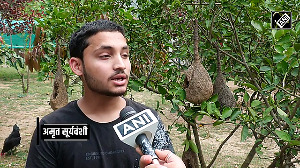In the midst of a rapidly worsening situation in Iraq, and the worst storm to hit Western Europe in years, all of the British media has been aflutter about the Shilpa Shetty incident on the reality TV show Big Brother.
Columnists in England rightly point out that Jane Goody's outbursts are not an isolated incident, but serve as a harsh reminder of the racism so widely prevalent in English society. A quick perusal of the comments posted by angry users on blogs and news sites speak volumes of the racism heaped on the Irish, South Asians and East Europeans on a daily basis.
Even though racism of any kind is completely inexcusable, there are three reasons why India should not respond to this incident and escalate it on the world stage.
Firstly, the incident did not take place on the floor of the United Nations or at a summit of the World Trade Organization. It took place on the sets of a TV show expressly designed to bring out the worst in people (to put matters in perspective, the argument between Ms. Shetty and Ms. Goody was triggered off by a discussion that focused on the number of cubes of chicken stock that should be used for good cooking).
The most preliminary research conducted into the history of the show will reveal that Big Brother has been marred by a history of racism and sexism. Most recently, an incident involving forced sexual assault had even forced the Australian Prime Minister John Howard to get involved.
One can only hope that Ms Shetty conducted the necessary research and entered the studio fully prepared for incidents of such a nature. During these difficult times, she needs to fall back on this historical perspective for strength (along with a comforting memory of the check that awaits her at the end of this show). She does not need the Indian government.
Secondly, as India asserts its presence as a global power on the world stage, it would do well to steer clear from the ills that have plagued Western societies. As has been proven by a number of incidents in America and Europe, being offended and stifling open dialogue does not eliminate racism. It merely bottles up angry thoughts and emotions that have no opportunity to interact with more sensible persuasions, thereby denying them any opportunity to be amenable to change.
India's history of encouraging open dialogue is a proud one. Ours is not a democracy that has flourished in an era of post-colonial independence. India's history of public debate stretches back to the days of Emperor Ashoka and Akbar who held events and court sessions for this express purpose. If Ms Goody and some other English people do think that Indians undercook our meals, we shouldn't snatch away the Indian menu from their tables. It would be more fitting to serve them a meal of sambar and rice, and show them the error of their perceptions!
We have a Parliament and a Prime Minister, but at heart we are not a Western style democracy, and it would behoove us not to be offended.
Lastly, this incident should serve as a wake up call for all of India. We are living in an era, where we take great pride in paying lip service to Gandhi -- or at least the teachings outlined in Lage Raho Munnabhai, the biggest blockbuster of 2006.
Both Gandhiji and Munnabhai would strongly encourage us to indulge in some self-introspection before pointing fingers at the world. Imagine if our country was sealed off in a glass cage for the next twelve weeks, and each of our actions be examined under a magnifying glass.
Wouldn't we still make fun of the dark skinned South Indians? Wouldn't some of us have a thing or two to say about lower caste people taking water from a common washbasin? Would we still not prevent Africans from entering some of the supposedly coolest bars and restaurants in South Bombay?
This is a time to put matters in perspective. It is a time to look at the ills affecting our society and push for change. But it is definitely not a time for anger.
Or maybe, it is a time for acceptance.
It is indeed a sad reflection our society, where the wisest words about the realities of racism might not have been mouthed by our platitude hugging leaders or self righteous "experts", but by a puppet on a Broadway show.
If we all could just admit
That we are racist a little bit,
Even though we all know
That it's wrong,
Maybe it would help us
Get along.
For now, like this wise puppet in Avenue Q, maybe that's a good approach to take.
Arun Krishnan describes himself as a dark-skinned South Indian. His thoughts (and the most popular Indian podcast on iTunes) can be found at https://www.cuttingchai.com






 © 2025
© 2025